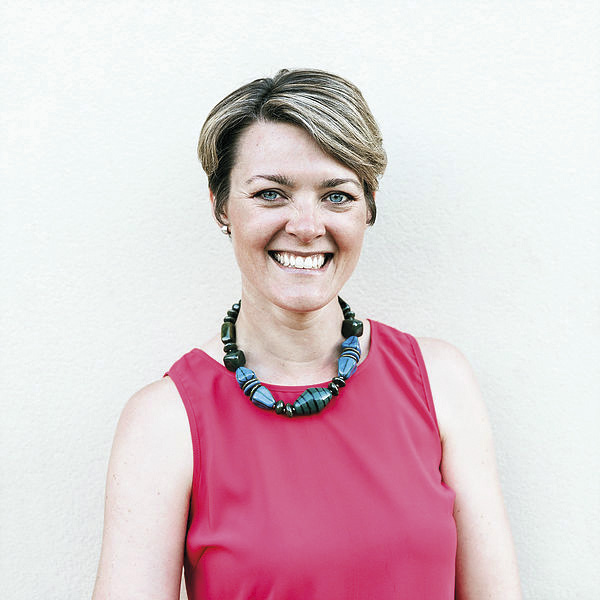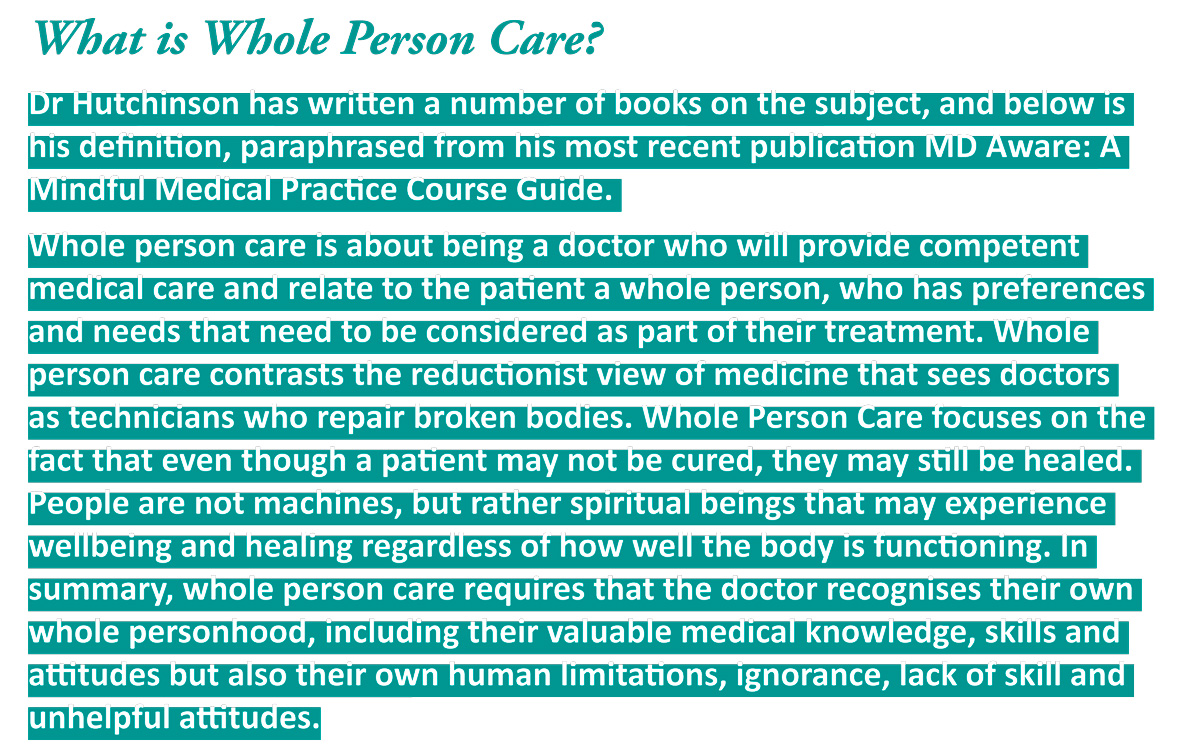 Busselton GP and educator Dr Sarah Moore takes a journey around mindful medicine.
Busselton GP and educator Dr Sarah Moore takes a journey around mindful medicine.
In October 2019, I was fortunate enough to travel to Montreal to spend two weeks on sabbatical at McGill University, based in the Programs in Whole Person Care in the Faculty of Medicine. This was as a consequence of my successful application for a Fay Gale Fellowship, which the University of WA awards annually to an early career academic.

While there, I attended the third International Congress in Whole Person Care, chaired by my sabbatical supervisor, Dr Tom Hutchinson, and the program included inspiring keynote speakers, practical workshops and presentations focussing on whole person care approaches to addiction, compassionate health care and culture change in health care.
One of the most powerful speakers was Dr Rana Awdish, who is a critical care physician and faculty member of Wayne State University School of Medicine in Detroit, Michigan.
She completed her medical degree at Wayne State in 2002, her residency at Mount Sinai Beth Israel in New York, and her fellowship training at Henry Ford Hospital where she currently serves as the Director of the Pulmonary Hypertension Program. She also serves as Medical Director of Care Experience for the entire health system.
 At the conference, she shared her experience of being seven months pregnant and finishing her critical care fellowship, only to experience a life-threatening intra-abdominal haemorrhage.
At the conference, she shared her experience of being seven months pregnant and finishing her critical care fellowship, only to experience a life-threatening intra-abdominal haemorrhage.

She described in detail her experience of arriving on the obstetric ward at the hospital where she worked and being greeted by a resident who admitted he didn’t have much experience with ultrasound. She reassured him she would help.
When she told him there was no fetal heart beat to be seen, he asked her “can you show me where you see that?”.
Next, she was rushed to theatre for emergency surgery, and she remembers hearing the anaesthetist say, “We’re losing her, she’s circulating the drain”. Then she arrested and the next thing she remembers is waking up very debilitated in ICU, having had a cerebellar stroke.
Her first thought was getting hold of a pen so she could ask, “am I dying?”. Her family wouldn’t give her one because they thought she was going to ask “is the baby alive?” and they feared that if they told her the baby had died it might impair her healing.
Later, she recalled overhearing her medical team discussing her management, and the resident said “she’s been trying to die on us” to which she thought, “I am not! Why do we have to be on different sides – I’m part of the team too!”
She then had an experience of bleeding into her legs and had to ask her treating medical team to examine her because not once had they done so, relying instead on blood tests and CT scans to determine her management. She went on to endure 12 months of slow recovery, experiencing further episodes of discoordination of care, inability of her treating doctors to attend to human suffering and poor communication.
However, she was able to report one positive interaction with her surgeon. He could see she was anxious about having a residual abdominal hernia, so invited her in for a consultation. He asked her “what are you most afraid of?” to which she responded “having an ostomy bag”. He replied, “I’ll do everything I can to avoid that”. There was no data he could give her to reduce her fear, but he could demonstrate rapport and trust, which is what she needed.
As a consequence of her experience, Dr Awdish has become passionate about improving the patient experience across the health system. She speaks about patient advocacy at health care venues around North America regularly.
Dr Awdish has also developed a model for healing, which she shared with us. It is simple yet powerful.
- Mutuality Doctors, patients and their families working together as a team, not in opposition
- Proximity Getting close to what makes us uncomfortable and sharing this, exposing our vulnerabilities in order to build rapport and trust
- Resilience Putting time and effort into the “rewards” of medicine, including meaning, healing, autonomy and gratitude, to allow us to endure and bounce back from the impact of the many stressors, including suffering, monotony, responsibility and blame.
- Humility Understanding that we do not know it all, but if we are open to different perspectives we can learn from others and deepen our wisdom
Dr Awdish has also developed programs at her hospital that target the gaps in care which she identified during her own experience as a patient.
CLEAR conversations training
When eventually Dr Awdish returned to work, she sought training in Vital Talk, a communications training program for health professionals. She then established a workshop program to train faculty and trainees in relationship-based communication skills. These workshops are run in small groups of eight physicians who take turns in giving bad news to a patient-actor following which doctors receive feedback from the actors. The aim is mastery through experiential and transformational learning. The values are CLEAR – Connect, Listen without judgement, Empathise, Align with patient values and Respect.
Creating a coaching environment
Dr Awdish believes that every doctor needs a coach, even after they complete their fellowship training. Atul Gawande has written a lot on this topic and much of the training that has been developed at Henry Ford Hospital is based on his work. One example of how coaching can be provided is encouraging medical staff to use reflective statements when talking to their patients and to each other. For example,
It sounds like what you value most is…
What I hear you saying is…
It seems you may feel…
What appears to be most important to you is…
Visual thinking strategies
At Henry Ford Hospital, all multidisciplinary teams go to the art museum together at the beginning of a new rotation. A trained facilitator takes them to a painting and asks the following questions:
- What do you think is happening here?
- What do you see that makes you say that?
- What else could you see?
All members of the team share their insights and through this process realise that everyone sees things slightly differently, illustrating the importance of shared decision-making. The purpose of the exercise is to demonstrate implicit bias and the importance of mutuality with the intention of building a positive team structure.
Narrative writing
Henry Ford Hospital runs practical workshops where medical staff read literature and poetry and watch films then share what they notice, either verbally or in writing. These reflective exercises encourage doctors to get in touch with their emotional responses and the value that comes with communicating these responses.
In closing, Dr Awdish stated that she set out to change herself but ended up transforming the culture of her hospital. A powerful and inspiring message for us all.
Now that I am back in Australia and reflecting on my learnings from Montreal, there are a number of actions I intend to take.
I already have an (almost) daily meditation and yoga practice, which I will continue. I have read MD Aware: A Mindful Medical Practice Course Guide and will be facilitating this seven-week course with my 10 Rural Clinical School (RCS) medical students in Busselton in 2020 under the guidance of Dr Hutchinson. I plan to establish a “Whole Person Care” interest group with academic colleagues from the RCS. I also anticipate facilitating regular debriefing sessions with my medical students to discuss the challenges they face, both personally and professionally.
I hope that each of these actions will allow me to strengthen my ability to provide whole person care and inspire my students to master this essential clinical skill.

